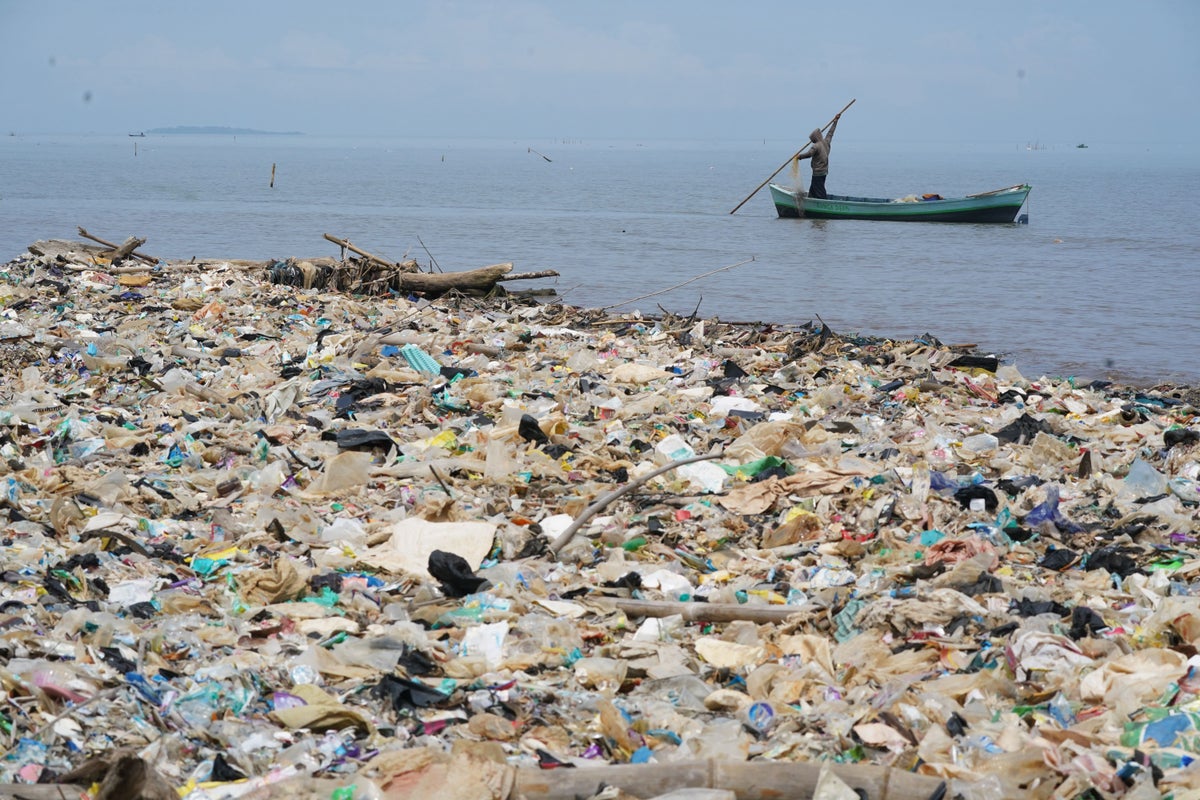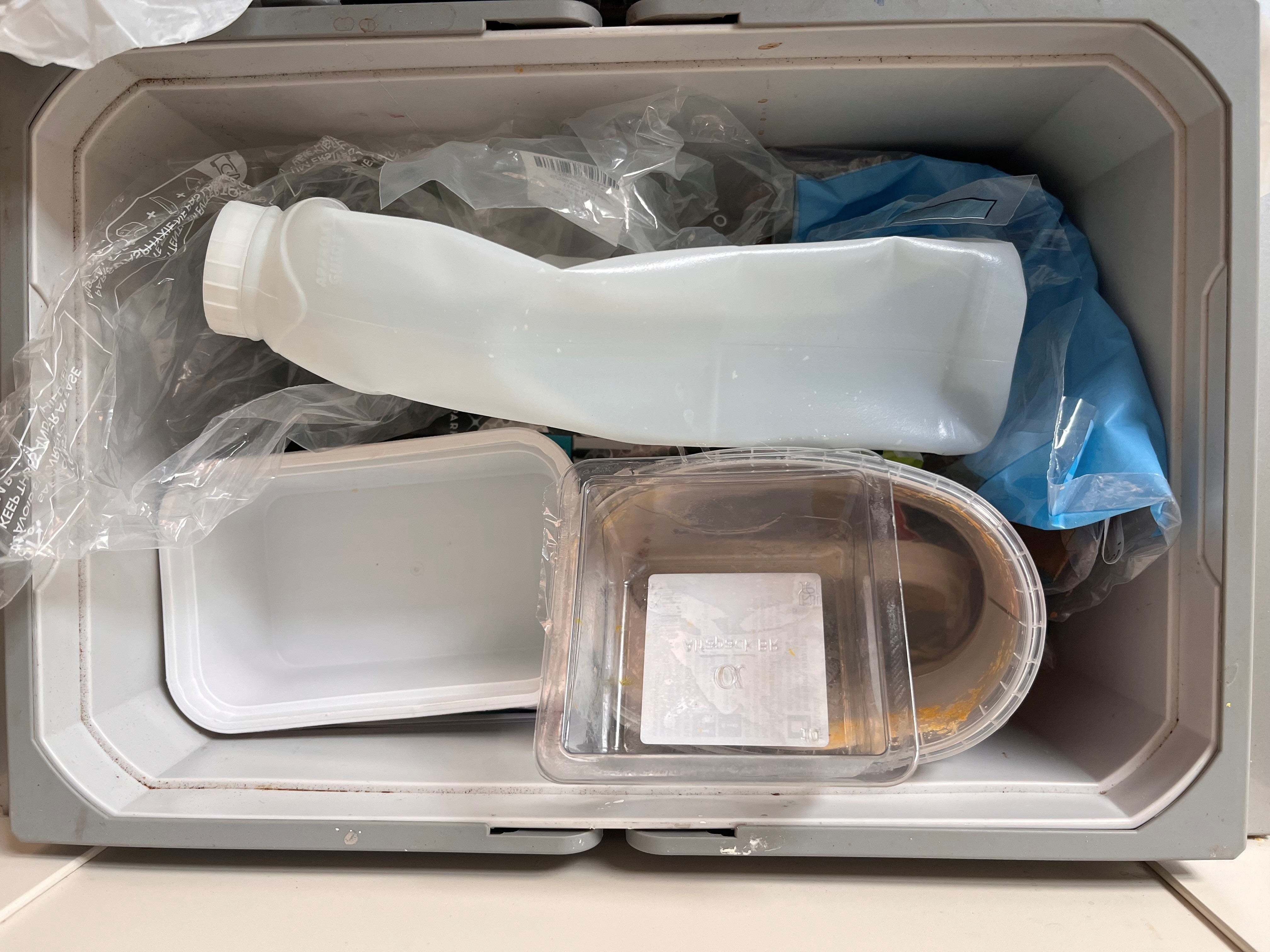
Less than a tenth of the 400 million tonnes of plastic produced around the world is manufactured from recycled materials, a study shows.
Researchers who tracked the global plastics supply chain also warn that just 9% of the plastic produced ends up being recycled – with only half of what is sorted and sent for recycling actually being reprocessed into new products.
Environmental campaigners said the study showed recycling to deal with the problem of plastic pollution harming wildlife, the environment and health was “a myth”, and called for efforts to curb the production of plastic.
The research comes as countries continue to negotiate a global plastics treaty, with 100 nations including the UK backing production cuts, but with talks so far failing to agree a deal.
The study by researchers in China and published in the journal Communications Earth and Environment analysed the global plastic supply chain in 2022, assessing types of plastics and their journey from feedstocks through to products, and how they are dealt with at the end of their life.

The assessment highlights annual global production of plastics grew from two million tonnes in 1950 to 400 million tonnes in 2022, and is expected to double to 800 million tonnes by 2050.
Just 38 million tonnes (9.5%) of the total plastic produced in 2022 came from recycled plastics, while 98% of the new or “virgin” plastic was produced from fossil fuels, primarily coal and oil, raising concerns about the climate impacts of plastic production, the scientists said.
While more than half of the plastic going into use in 2022 went into sectors such as building and construction, automotive, electrical and electronic goods, household and textiles, some 158 million tonnes was used in packaging, almost all of which was then thrown away.
Overall, 268 million tonnes of plastic was disposed of in that year, the researchers found, with just half of the 75 million tonnes sorted and collected for recycling actually being recycled.
The study shows global rates of recycling are “stagnant” at 9% of total production, and used to deal with just 14% of the plastic disposed of in 2022.
Incineration is becoming increasingly common, used to dispose of 34% of plastic rubbish, while 40% is landfilled and around 11% “mismanaged”, the study shows.
The figures also showed the US had the highest plastic consumption per person, while China consumed the most plastic overall, 80 million tonnes.
The researchers warned the high reliance on fossil fuels for plastics production will “further compromise” global efforts to tackle climate change, but also said plastics result in lower greenhouse gas emissions throughout their life cycle compared with alternative materials such as metals or glass.
And they said “bioplastics”, made from organic material which account for just 2% of virgin plastics, faced challenges including potential emissions during production, environmental impacts such as the land they need for crops to grow and competing with food production.
They wrote: “This paradox amplifies the dilemma: while plastics contribute to fossil fuel dependence and pervasive pollution issues, they simultaneously provide environmental benefits in terms of reduced emissions and energy efficiency.
“The lack of viable alternatives to plastics that can be implemented on a global scale presents a significant challenge in the quest for sustainable solutions.”
They said reducing plastic flows was a “crucial solution” and focusing on strategies such as recycling, reuse, and redesigning products for longevity could minimise the environmental impact of plastics.
Responding to the study, Laura Burley, Greenpeace UK plastics team leader, said: “Many of us are disturbed by plastics pollution and the harm it poses to wildlife and our health.
“But there’s much less awareness that – despite all our best efforts to sort household waste – plastics recycling is basically a load of rubbish.
“The recycling myth is Big Oil’s distraction tactic so people don’t realise they actually keep producing more and more new plastic from oil, fuelling the climate crisis, as well as polluting the planet.”
“The real solution is to stop making so much plastic in the first place,” she said, calling on the UK Government to push for a strong global plastics treaty which sees production cut by at least 75% by 2040.
Campaigner Sian Sutherland, co-founder of A Plastic Planet and Plastic Health Council, said: “We’ve long known that recycling is a myth, but corporations keep pushing to play it as their get-out-of-jail-free card.
“We are led to believe that there’s a future for plastic if we just sort it into the right bin. The facts tell a different story.”
She warned that the majority of the plastic manufactured as rates double by 2050 would be made from fossil fuels and mixed with toxic additives, and said recycling was “pumping out a toxic brew of unknown chemicals from discarded plastic into packaging or products” that would affect health.
“Unless we start phasing out plastic for good, we’re just digging a deeper hole, for our health, our planet that nurtures us, and the generations to come,” she warned.
An Environment Department (Defra) spokesperson said: “We urgently need an ambitious international agreement to end plastic pollution by 2040 and are working hard with other countries to reach an agreement.
“This Government is taking action to end the throwaway culture by promoting a circular economy where we reduce waste, including banning single-use vapes.”







